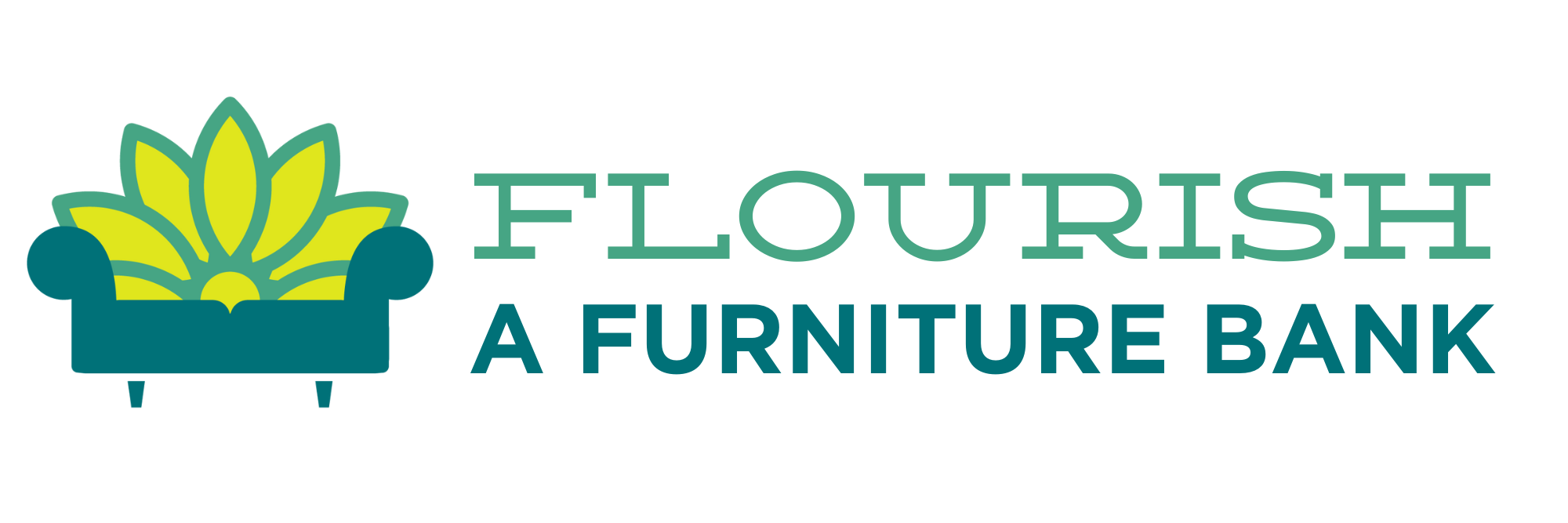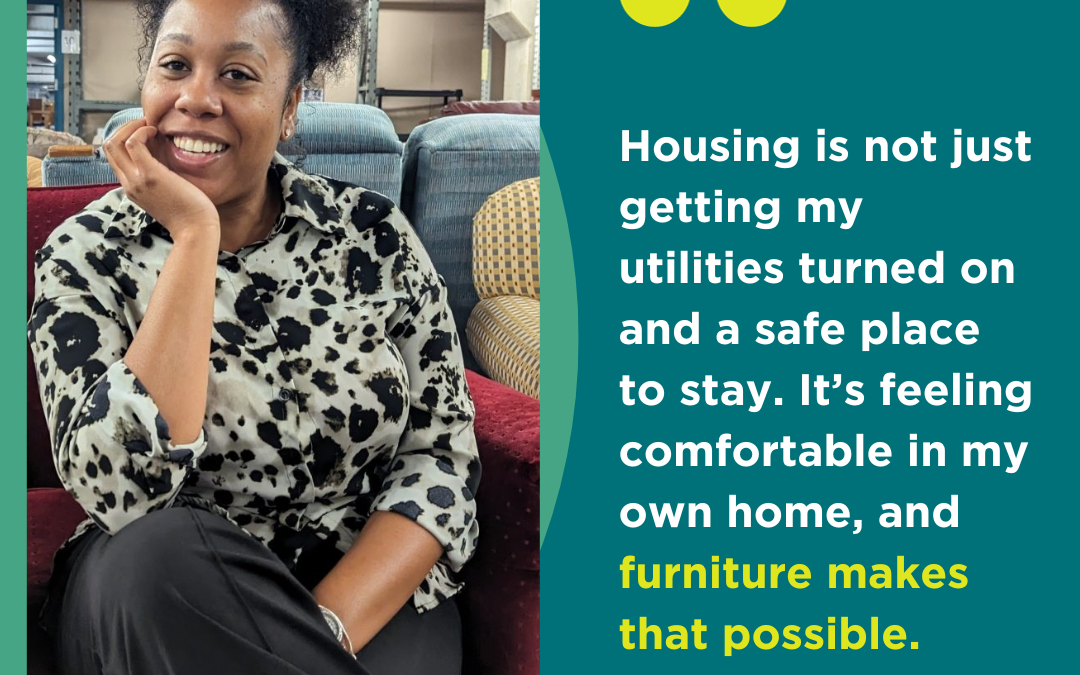We recently had the opportunity to speak with Alexis Martin, Social Services Manager at Reconciliation Services. Reconciliation Services is a Kansas City nonprofit that refers families to Flourish Furniture Bank. Read on the learn about the incredible resources they provide, details about our partnership, and what it takes to make transformational change.
Your donation to Flourish makes our partnership with amazing agencies like Reconciliation Services possible. Thank you for providing essential whole-home furnishings to families overcoming historic barriers in Kansas City!
Make a gift and furnish a home today.
Can you start by introducing yourself?
My name is Alexis Martin. I’m the Social Services Manager at Reconciliation Services. I’ve been there almost two years but I’ve been in the mental health field for about 10 years.
What was your introduction to mental health work?
I started out working for a children’s facility called Will’s Place in Joplin, Missouri. I was a case manager for children with behavioral health needs. I would support them in the community, at their school, at psychiatry appointments. My job was to get to know the child and the family to ensure they had wrap-around support.
What is the core mission of Reconciliation Services?
The core mission and vision of Reconciliation Services is to bridge the gap between the redlining that was once on Troost and reconcile those two very distinct neighborhoods. It’s about bringing together those who are in poverty and those who are not. It’s a place where you can know that we’re all human, we’re no different from each other. So fellowship is the main thing, but we also provide services. A lot of our support comes from the community then goes back into the community. Every boxed lunch that is purchased from Thelma’s Kitchen, 80% goes back into the social service programs. So imagine you’re just coming in to get a nutritious meal, but you just paid for someone to get an ID.
Can you give me an overview of Reconciliation Services?
Reconciliation Services has three main departments. I’ll start with Thelma’s Kitchen. It’s a pay-what-you-can café located on 31st and Troost. So again, when we talk about dignity and worth of an individual, it’s about how you can participate on your own. Even if I don’t have three dollars, I do have two hands with which I can actually work for my meal just like everyone else that has come here. It’s not a separation of who may be homeless or not. It’s really a community lunchroom. Thelma’s Kitchen is amazing, especially with our Head Chef Natasha.
Our second program is REVEAL. It includes our social services, case managers, interns, and therapy team. Everything that we do is absolutely free of charge. You don’t need insurance. We welcome everyone 200% below the poverty guideline to be able to access our services. We operate on a walk-in basis for our emergency support – things like getting ID’s, documents, birth certificates, utility assistance, and rental assistance. Our end goal is always to get you stable in your community and more self-sufficient. That might look like volunteering at Thelma’s Kitchen to learn skills before you re-enter the workforce. Or it could be finding benefits because you’re older or have a disability that makes working unsuitable. REVEAL therapy is run by Shaleese Rocket.
Our third program is Foster Grandparents, a 55 and older program. We encourage grandpas and grandmas to come in and be a support in the school districts – at Kansas City and Hickman Mills Districts, daycares, and Operation Breakthrough. They provide supportive services for the children in each classroom. The grandparents receive a monthly stipend and training, then they go into schools and be that extra support for the children. Because as we know, some children may not have grandparents still living. So this is just another level of comfort, another layer of love in the classroom every day. The Foster Grandparents program is run by Ashley Morgan.
What is the greatest impact of your work?
We engage the whole person through our case management services. Sometimes it’s just a one-time thing, like I don’t need my ID renewed every year, but I do need housing, a job, and a birth certificate. Or maybe I’m just down on my luck this month, and so assistance with water is just a one-and-done service. But case management really works on the transformation of an individual. Breaking generational poverty is taking you from something you know and building on top of that. The weekly one-on-ones with case managers have transformed so many lives.
Maybe someone has just come out of chronic homelessness, or they were incarcerated. They’ve moved from housing assistance to transitional living, to permanent housing by working with our program. But without other services, it’s just a band aid over a much larger wound. If I need stitches but you give me a band aid, what am I going to do? I’m going to be back in the same position but even worse. It’s just the same with mental health. We want to make sure that we’re not just giving out band aids. We’re really stitching it up and piecing their lives together, one day at a time, one meeting at a time. We work with people who have been without for a very long time. Together, we show them that there’s something more that they can tap into.
So even just coming to Reconciliation Services is telling our staff I see something more for myself. And then our job is to ask, What does that look like? What are your goals? How do you see yourself? Where can we step in and assist you?
How is Flourish a part of that?
It’s still not easy once you’re stably housed. You still need to be able to support yourself in that house. I have a roof over my head, but I still need things to actually furnish my house. How can I make this house a home? That’s where Flourish comes in.
Partnering with Flourish has been such an asset. There are so many older individuals who we send here, and we hear all the time that “I can actually invite my grandchildren over now that I’m stable too.” They don’t have to live with their child or on the street. Furniture gives families dignity. It plays an important role in housing and in someone’s life and what they think about themselves. Because a lot of times they’re dealing with brokenness and grief, with a poverty mindset. A big portion of that is furniture.
Everyone thinks about housing, but no one thinks about furniture until it’s time for you to move in. And then you’re dealing with an empty canvas. Luckily, we have you guys so we can say, Hey, I have someone who can help. Housing is not just getting my utilities turned on and a safe place to stay. It’s feeling comfortable in my own home, and furniture makes that possible.
Flourish really does change lives. I remember speaking with a client who was able to utilize your service. He thought that he was going to be overbearing or ask for too much. But he was invited to think of a little bit more than what we put on his preference sheet. Your volunteers said things like “Okay, we do have extra in this area, so don’t feel bad if you need more.” And so just with that inviting personality and smile, it made him feel like, “Hey, I’m not asking for too much. My needs are going to be met here.”
So he came in feeling ashamed of needing to ask for things. But the volunteer who helped us led him to be vocal about what he liked. The message was definitely, “This is your shopping experience. This is all for you.” It really changed his mindset. So even when you don’t think you’re providing validation to someone, the encouragement and the affirmations make a big difference.
What is the most important thing for families to achieve stability?
It’s self-determination above all. I think about the stages of change – precontemplation, contemplation, and action. Once you do these stages of changing in your life, you have to be determined. You have to be resilient and really show up, because you’re going to get a lot of no’s before you get yes’s. But if you keep waking up in the morning and keep going after whatever it is that you want, it is sure to come to you.
Is there anything you’d want people to know?
That we’re all deserving of love. We’re all worthy, we’re all human. Dignity and worth of a person is so important. Everyone deserves to be loved and to have a little bit more than their basic needs met. So many organizations just meet basic needs and think that person is good to go. But what if I told you that’s not enough? Yes, food, water, shelter, but is that enough to move someone out of generational poverty? What if I told you they need education too? Yes, they need shelter, but then also a bed to sleep on. We really deserve a little more so that we have a fighting chance at life. I think that’s what love is – not being forced down to the bare bones of survival. It’s having that flexibility and connection to do a little more.
What’s coming up for Reconciliation Services?
We have the Hike for Reconciliation Services coming up on November 4th. It’s going to be a block party from 10 am to 4 pm. All our staff will be on site, and our guests and neighborhood partners are also welcome! It’s going to be a big event. We’re going to hike around the old Potter’s Plantation that used to be located on Troost. We’re really hoping to show the reconciliation on Troost, how what used to be a dividing line is now a gathering place. We’ll be starting at 31st and Troost. Thelma’s Kitchen will be whipping up some great food and we’d love for Flourish staff and volunteers to come out! Click the link to sign up for a team or come as an individual.
Any closing thoughts?
I just want to say thank you for the opportunity. Flourish is innovative on the next level. Through our partnership, we’re able to help other case managers who may not have access to these services by teaching them about it. So it’s never just our clients that we’re serving, it’s so many more people. Flourish is one-of-a-kind and it’s needed. You guys mean a lot to us. Thank you for being here!


Recent Comments